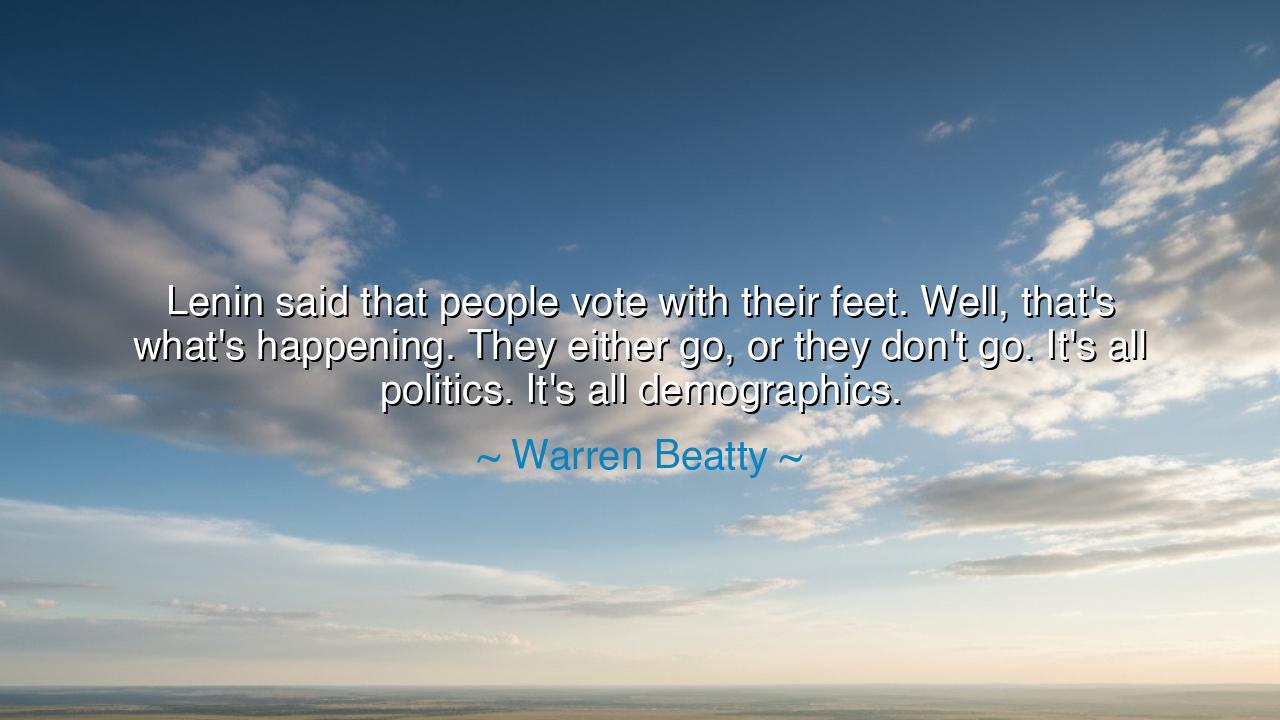
Lenin said that people vote with their feet. Well, that's what's
Lenin said that people vote with their feet. Well, that's what's happening. They either go, or they don't go. It's all politics. It's all demographics.






When Warren Beatty declared, “Lenin said that people vote with their feet. Well, that’s what’s happening. They either go, or they don’t go. It’s all politics. It’s all demographics,” he was summoning an old truth and applying it to the modern stage. His words remind us that beyond speeches, beyond ballots, beyond all the lofty trappings of governance, the true measure of politics lies in the choices of the people—whether they show up, whether they leave, whether they act or remain still. This silent movement is itself a vote, a declaration of allegiance or rejection.
The phrase, born from Lenin, carried the power of revolution. In his age, men and women abandoned farms, factories, and even nations, “voting with their feet” against systems that crushed them. To walk away was to declare the failure of rulers, to renounce with action what words or ballots could not change. Beatty invokes this ancient force of human will, reminding us that whether in elections, in migrations, or in the boycotts of commerce, the feet of the people are instruments of power.
History gives us vivid proof. During the American Civil Rights Movement, African Americans “voted with their feet” by refusing to ride segregated buses in Montgomery. Their absence spoke louder than any ballot cast, crippling the system until justice could no longer be ignored. Likewise, in Berlin before the Wall was raised, East Germans streamed westward, their footsteps proclaiming their rejection of tyranny. These acts revealed what Beatty affirms: that demographics, the gathering and dispersing of people, is itself the lifeblood of politics.
Beatty’s words also carry a warning. Leaders may craft laws and strategists may analyze trends, but in the end, it is the people who decide, often in ways unseen by rulers. A crowd that stays home on election day speaks with as much power as one that floods the polls. A people who migrate away from poverty or oppression issue a condemnation sharper than words. To ignore these movements is to misunderstand the very essence of politics.
Thus, let this wisdom endure: watch not only the speeches and the ballots, but the footsteps. For the march, the boycott, the migration, the absence—all these are votes cast in the great arena of history. Politics is not only what is said in chambers of power, but what is chosen in the daily lives of the many. And as Beatty reminds us, in the end, it is the feet of the people that carry the weight of destiny.






NHNguyen ngoc huong
I find Beatty’s comment thought-provoking, but it raises the question: are we truly aware of the impact that demographics have on political landscapes? Does the idea of voting with one’s feet reflect a broader dissatisfaction with the system? How can policymakers address the root causes of why people choose to leave or stay, and how can we create a system that offers more stability and opportunities for everyone?
3K32_nguyen_ khanh_ngoc
Beatty’s comment about people voting with their feet emphasizes how movement and migration are deeply tied to political and social forces. But what about those who are forced to move, such as refugees or marginalized communities? Is it fair to call their movement ‘political’ when they often have little choice? What does this say about the power dynamics that push people to make these difficult decisions?
HDNguyen Hoang Duc
This quote speaks to the idea that people’s actions—whether they leave or stay in a given area—can be seen as political statements. But does this oversimplify the issue? Is it truly a matter of choice for everyone? For many, leaving or staying may be influenced by factors beyond politics, like economic opportunities, safety, or family needs. How much agency do individuals really have when it comes to ‘voting with their feet’?
CCaoanhduy
Warren Beatty’s reference to Lenin’s idea that ‘people vote with their feet’ highlights the powerful influence of migration and movement in shaping politics. It makes me think about how demographic shifts can be a response to political and social conditions. But are these ‘votes’ really heard by those in power? How do we ensure that people who leave or stay based on these pressures are represented and that their ‘vote’ counts in policy-making?